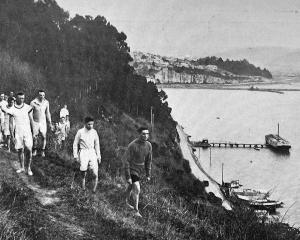In fact, the board had not met since the Hon. J. Allen, as Minister of Finance, held out no hope to the board of the Government assisting it out of its financial difficulties by way of a grant.
It was natural, therefore, that the board, on meeting on Friday, should straightway begin to ponder on the question of how it was to carry on with insufficient funds, but the secretary lightened members' hearts by explaining how the board could get through the year on its own resources, and yet satisfy the bankers.
All the time that the Clyde has been lying idle since her mishap last December the younger steamer, the Clutha, has been steadily earning freight, and the accumulated takings, together with revenue from endowments, would, in the secretary's opinion, enable the board to carry through for the year within its limits of a bank overdraft of £3173.
The financial statement showed that from June 18 to September 3 there had been a profit of £80 13s 11d on steamer running, and there was freight outstanding to the extent of £426 19s, but accounts outstanding in connection with coal boats, office expenses etc., totalled £627 5s 5d, and these accounts were passed for payment.
It was stated that the total cost in connection with the salving of the Clyde would be about £1200, and considering that if the work had been let by tender, the lowest estimate would be £1000, the board felt satisfied that results justified it in carrying out the salvage work itself.
The Clyde is now in perfect repair after her long immersion, and as the Clutha requires necessary repairs, it was resolved to endeavour to get the former boat put in commission as soon as the marine inspector would issue permission.
After the Clyde has been attended to she is to be put on dredging gravel, first for the Land Board, at Manuka Island, and thereafter wherever required.
• Speaking at a farewell to Mr A. McIntyre at Port Chalmers last night, the chairman (Mr D. A. de Maus) referred to the shipping interests of the port.
He said that this was essentially a shipping community, and the people had to rely on shipping for their daily bread. What they wanted to see was the shipping at the port go ahead.
The wharves had suffered since the channel had been responsible for taking the shipping to Dunedin. Dunedin had sacrificed Port Chalmers by taking shipping up to the city, and had benefited as a consequence.
Over 35 years ago they had 2020 inhabitants at Port Chalmers, but the last census revealed the fact that there were only 2200 people there, showing that the town had progressed less than any other town in the dominion.
He hoped the day was not far distant when Port Chalmers would again come to the fore.
• Otago has lost another of its old identities through the death last week of Mr William Hope Miller, of Manuka Creek. A native of Kelso, Scotland, Mr Miller came out with his parents in 1858 in the ship Jura, a lad of 15 years.
After spending a few years in various parts of Otago, chiefly in the district called after him and his brother, Miller's Flat, he settled down permanently to farming at Manuka Creek.
There he lived for 50 years, taking a lively interest in Presbyterian Church and local matters, as well as in farming. The exceptionally large gathering that followed his remains to the Fairfax Cemetery was testimony to the esteem in which he was held in the Milton and Manuka districts.
- ODT, 10.9.1915.











